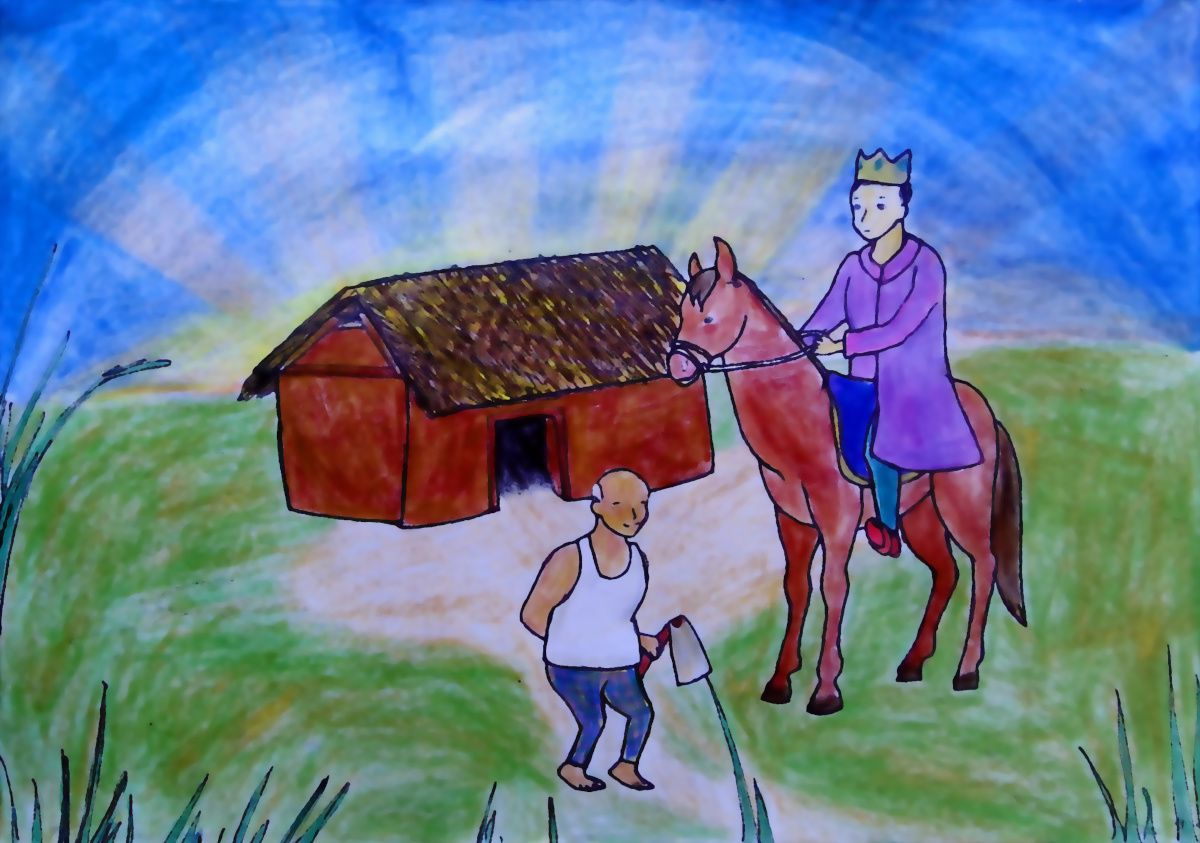A Man of Contentment
Does satisfaction depend on what you have—or on how you think about it?

Does satisfaction depend on what you have—or on how you think about it?
When I was in class 2, I came across “The Miller of Dee”, a traditional English folk song. The poem tells a beautiful story about a poor miller living beside the river Dee. He had to maintain his big family with the little that he earned from his mill. Thus, the miller was a very hard-pressed man and did not have a comfortable life.
Yet, the miller in the story was not worried. He was happy and content in the midst of wants and poverty. In the poem, even the King of Hall of England sees the miller’s life, and is very much impressed by it—envious, in fact.
When I read the poem, I learned many things. If you want to make your life a great one, you have to be kind hearted. When our teacher asked us what we learnt from this poem, some of my friends said “we have learned that we have to be happy every time.”
But there was a confusion between us. Was there a correct answer for this question? “You have all told the answers correctly,” our teacher said, “but it is not that answer.”
Today in psychology, there is a lot of focus on positivity, pleasure, and happiness. They say that, if you are mindful of the good things you have, and know what makes you happy, you can concentrate on that and get more of it. This trend is not new; even the US constitution gives every American the right to “life, liberty, and the pursuit of happiness”.
In 2016, four psychologists surveyed their field as part of a study and realised that, in spite of all the focus on positivity, there was very little work done on a similar but subtly different state of mind: contentment.
Over the years, psychologists had moved from happiness into more nuanced concepts like amusement, awe, gratitude, and triumph. But the authors of the study realised that most of these are “high arousal” emotions. They tend to activate the central nervous system. What was missing was positive states that relax the nervous system, like peace and contentment.
Because there was not much academic material to go on, the four psychologists turned to philosophy from different parts of the world, where the concept of contentment has been discussed and described for over 4000 years. One of the earliest mentions comes in the form of santosha, described in the Bhagavad Gita: “One who revels only in the universal essence, and is content [santosha] in the universal essence, no duty exists for him.”
In Bhutan, the principle of chog she or “enoughness” describes a practical lifestyle that avoids excess, and balances work, family, friends, and social duties—but it can also be used for a more spiritual dimension of completeness.
“The meaning of the poem”, our teacher explained, is contentment. Contentment means remaining satisfied with what you got in your life or what one possesses. It is a great virtue like honesty, truthfulness and manners.
“A man of contentment has many advantages over others. He does not run after more and more; he is happy and satisfied with what he got in his life. If he has only a small house to live in and torn old clothes to wear, he will think that God has willed only such things in his life, and be satisfied. That is the meaning of contentment.”
When I reached home after coming from school, I was thinking deeply. Something I learned today That we should not be sad or depressed if we have nothing that we think we haven’t got.
Across different cultures, the researchers found many common threads. One of the main ones was that of “perceived completeness”—this means thinking that the present situation is enough, without desiring anything more.
Perceived completeness is not about what you have, but about how you think about it. A man may be rich and have a large number of things—but this will not make him happy if he ends up wanting even more.
Reading about this, I thought, what about people who have a lot of things and are also content? Contentment doesn’t mean throwing away everything you have, and living with less things won’t automatically give you contentment. I think this is what the term “perceived completeness” tells us. It is not about how much you have, but how you think about it.
This reminded me of a story told by my grandmother, who heard it from her father, many years ago.
There was once a king who had everything and more, but was never satisfied. He would not just collect new things, but also wanted to show them off to everyone he met. Eventually, he got married to the daughter of another king and made her queen.
Unbeknownst to him, the new queen was very greedy and clever. One day, the king began showing off his wealth, describing the many valuable items he owned—including an old and rare archaeological sculpture, and the ownership papers for other kingdoms. Eventually, the queen convinced him to show her where all these treasures were kept and how to access them.
Having found out this information, the queen made plans to steal them. She got the archaeological sculpture from the palace, retrieved the kingdoms' property papers, and collected the other rare items he had. Then, she ran away with her father. The kingdom was destroyed, and the king was thrown out from the palace because he was no longer the owner of the kingdom.
From that day, the king learned that being happy with what we have means not only possessions, but also attention. There are some things to be shared, and some things better kept to oneself instead of trying to brag to the world about it.
Is happiness within our control? Sometimes, it can seem like the world is making us discontent. In 2019, a team led by behavioural science professor Andrew Oswald looked at survey data from several European countries, about how happy the citizens of those nations were. Then, they compared that with the annual advertising spending in those same countries.
What they found out was an inverse relation between the two. When more money was spent on advertising, people reported being less happy—and vice versa. Their suggestion: advertisements make us unhappy. When money is spent on advertising, it results in diminished well-being for the people there.
This is only one study, so we should remember that there is no direct connection proven. But it does make sense. Discontent is the entire job of advertisements: they want to convince us that we’re not happy, but we can become happy if we just get that one product they’re trying to sell.
Satisfaction just on a personal level. Behavioural economists are familiar with a concept nicknamed “keeping up with the Joneses”. The term comes from a popular 20th-century comic strip, but here “Joneses” refers to one’s neighbours.
If you see your neighbour having a bigger house or a better car than you are, you will want to get one too. So you will try to work harder, get a better job, and earn more money. Unfortunately, when you earn more and get a better house, you will probably also move to a new, wealthier neighbourhood. Compared to your new neighbours, you may not be so well off because they would have even bigger cars and houses than you do. And so, the cycle continues.
It is not just about yourself; you also want to show to the outside world that you are as well-off as everyone else around you. This phenomenon is called “conspicuous consumption”, where you spend money on things that show off to the world how much you have. Earlier, when people spent so much, it meant they actually had that much money. But now, in a world of loans and post-payments, many people spend money that they don’t yet have—which forces them to work more to pay off their debts.
Imagine what would happen if we all stopped to ask ourselves: do we really need those things?
Contentment does not mean laziness or inaction. It does not mean that people should do nothing and sit idle, or that they should make no effort to improve their lot or fate in life—no, it does not mean this. It means that a man should be happy with his surroundings and life. He should not be envious of others and should not be greedy, but should still put in his best.
Psychologists also warn against suppressing your emotions. If you are feeling sad, you shouldn't think “oh, I should be positive and be happy” and suppress your sadness. In the long run, the sadness will remain buried and resurface later. The earlier you acknowledge what you feel, the earlier you will be able to deal with it.
But once you’ve dealt with your emotions, you can use mindfulness to be aware of what you have and separate what you really need from what you could quite happily do without. You can focus on what will be useful for you in the long term, not things that will only bring you joy for a brief while.
I could go on writing about contentment, but there is such a thing as an article going on for too long. For now, let us stop here to think about this, and be content!
